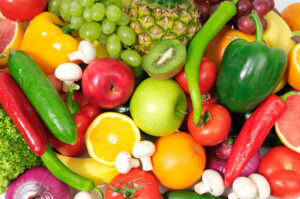March 07, 2023 | Black & Kletz Allergy
 Pollen Food Allergy Syndrome (also called pollen food allergy syndrome) is a condition where there is a cross reaction to allergens that are found both in pollen and certain foods. The most common foods associated with pollen food allergy syndrome include fresh fruits, vegetables, and some tree nuts. The disorder affects roughly one-third of individuals with seasonal allergic rhinitis (i.e., hay fever).
Pollen Food Allergy Syndrome (also called pollen food allergy syndrome) is a condition where there is a cross reaction to allergens that are found both in pollen and certain foods. The most common foods associated with pollen food allergy syndrome include fresh fruits, vegetables, and some tree nuts. The disorder affects roughly one-third of individuals with seasonal allergic rhinitis (i.e., hay fever).
The primary inner workings of pollen food allergy syndrome is a genetically determined “sensitization” of the immune system to various pollens and the ensuing “reactions” when exposed to these pollens. The immune system sees these pollens as “foreign” and consequently reacts against them resulting in the irritating symptoms of hay fever. The immune system recognizes the pollen as well as similar proteins in the food and then subsequently directs an allergic response to the allergenic protein. An easy way to think of it is that your body sees the food as the pollen since the allergenic proteins of the food is very similar to the allergenic proteins of the pollen. If you are allergic to a pollen such as birch tree pollen, you will then mount an allergic response to a cross-reacting food such as a raw fresh apple even though you are not allergic to that food (i.e., apple) because your body normally mounts a response to that birch tree pollen. It is important to note that in most instances, the person can eat the food if it is cooked (i.e., baked apple) without allergic symptoms. The reason individuals can usually eat the cooked version of the food is because the heating process changes the structure of the protein of the food so it looks different structurally. This structurally changed food protein is not recognized by the immune system as a protein that is similar to the pollen, and thus no allergic reaction occurs.
The symptoms of pollen food allergy syndrome may include itching of the lips, tongue, gums, palate and/or throat after eating raw fresh fruits, vegetables, and/or some tree nuts (i.e., almond, hazelnut). The symptoms usually start within a few minutes after eating the raw fresh fruits, vegetables, and/or tree nut and generally abates within a few hours. The symptoms of pollen food allergy syndrome are usually minimal, but in rare cases, they can cause throat swelling and/or difficulty in swallowing. Such severe reactions are more likely to occur with peanuts and/or tree nuts. It is important to establish that some people with itchy lips, mouth and/or throat after eating a raw fresh specific fruit, vegetable, and/or tree nut may in fact have a true food allergy to a specific fruit, vegetable and/or tree nut and not have pollen food allergy syndrome. These “real” food-allergic individuals usually will have the same or comparable symptoms even when eating the fruit/vegetable cooked, unlike patients with pollen food allergy syndrome who can usually tolerate the cooked fruit/vegetable without symptoms.
Pollen food allergy syndrome tends to be more prominent and bothersome in the Spring months when one is exposed to higher levels of pollen. Specific tree pollen sensitivity cross-reacts with specific fruit/vegetable/tree nut proteins due to the closeness in the amino acid sequences of the allergenic proteins. For example, patients with birch pollen sensitivity tend to react more commonly with fresh raw pitted fruits (e.g., apples, peaches, pears, apricots, plums) as well as carrots, peanuts, and/or tree nuts. Individuals with allergies to grasses may have a reaction to celery, peaches, melons, (e.g., watermelon, honeydew, cantaloupe), oranges, and tomatoes. Ragweed pollen sensitivity in the Fall usually cross-reacts with bananas, melons, cucumbers, and/or zucchini.
The diagnosis of pollen food allergy syndrome is made commonly by a history of oral pruritus (i.e., itching) and irritation in individuals who have previously tested positive for allergies to pollen and are symptomatic during the corresponding pollen seasons.
The treatment of pollen food allergy syndrome involves evading the offending raw fresh fruits/vegetables/tree nut. Peeling the skin before eating and/or cooking (i.e., baking, microwaving) before eating the food may reduce the severity of the symptoms, as heat denatures the allergenic protein which thus decreases its allergenic potential.
The board certified allergy doctors at Black & Kletz Allergy have expertise in diagnosing and treating pollen food allergy syndrome as well as food allergies. . We are board certified to diagnose and treat both adult and pediatric patients and we have been doing so in the Washington, DC, Northern Virginia, and Maryland metropolitan area for more than a half a century. Black & Kletz Allergy has offices in Washington, DC, McLean, VA (Tysons Corner, VA), and Manassas, VA. All 3 of our offices have on-site parking. For additional convenience, our Washington, DC and McLean, VA offices are Metro accessible. Our McLean office location offers a complementary shuttle that runs between our office and the Spring Hill metro station on the silver line. For an appointment, please call our office or alternatively, you can click Request an Appointment and we will respond within 24 hours by the next business day. If you suffer from food allergies, food sensitivities, or pollen food allergy syndrome we are here to help improve your life by preventing unwanted food-related symptoms that have been so troublesome. Black & Kletz Allergy is devoted to providing the highest quality allergy care in a comfortable, compassionate, and professional environment.












